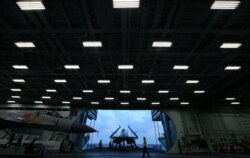Chinese military drills in the East and South China seas this week failed to rattle militarily weaker neighbors because, defense experts say, most have grown used to the exercises and fear them less than they did a decade ago.
One neighbor, Taiwan, even test-fired missiles in response.
Media outlets in Asia reported this week that the Chinese Maritime Safety Administration said it would use airspace and waters off the coast near Shanghai as well as farther south, closer to Hong Kong, for military exercises.
Those waters adjoin areas that China contests with Japan and Taiwan. Four Southeast Asian countries and Taiwan also dispute parts of the South China Sea, beyond Hong Kong, with the government in Beijing.
Exercises of this type have grown so routine that surrounding countries pay little attention. Those reactions show that they see China's growing military might as muscle flexing with a message rather than a precursor to conflict, analysts in the region believe.
"Over these years, I think China has more or less desensitized regional countries to its drills," said Collin Koh, maritime security research fellow at Nanyang Technological University in Singapore. "The regional countries would pay attention to it. They would probably show a little bit of concern about the intensifying exercises, but they probably wouldn't see that as leading to something extraordinary."
Frequency of military maneuvers
This week's offshore exercises were scheduled to end Friday, according to Asian media reports. China also held a massive South China Sea drill in April 2018. A year later its military aircraft flew in airspace near Taiwan and Japan. Last week, Chinese planes joined forces from Russia in flying over tiny East Sea islands disputed by Japan and South Korea, according to Asia media reports.
Japan and South Korea both protested the China-Russia movement, while Taiwan test-fired 117 missiles during China's maritime exercises earlier this week.
Muted reactions
For the most part, countries around Asia reacted mildly to China's latest maritime exercises.
Vietnam, the Philippines, Brunei and Malaysia dispute Chinese claims to the resource-rich, 3.5 million-square-kilometer South China Sea. Their foreign ministries often protest Chinese military activity but seldom follow up.
Taiwan, a self-ruled island 160 kilometers away from China and claimed by Beijing as part of its own territory, normally protests as well without countermeasures. China, for its part, never strikes foreign targets. The Communist leadership said this week it was marking Armed Forces Day.
Japanese citizens have "gotten used to" Chinese military movement in waters near their country, said Jeffrey Kingston, history instructor at Temple University's Japan campus. Ten years ago, he said, people felt "shocked."
China and Japan, once World War II rivals, still contest sovereignty over eight uninhabited East China Sea islets. Japan sometimes scrambles planes to chase Chinese aircraft.
"Just in general, China is flexing its muscles and essentially affirming the Japanese perception that China has hegemonic ambitions in the region," Kingston said.
All countries in Asia prefer a non-military response to Chinese movement, said Stephen Nagy, senior associate politics and international studies professor at International Christian University in Tokyo.
China sending messages
China gears its offshore military activity to send political messages overseas, from Taipei to Washington, political analysts in Asia say.
"There is always a clear political meaning behind those drills, not only for a domestic audience," Koh said.
This month, China was reminding Japan it wants recognition for its claim to the disputed islets, Kingston said. It's also warning Taiwan after the island government accepted a $2.2 billion package of advanced tanks and missiles from the United States — with hopes of buying American-made F-16 fighter planes next, Koh said.
China sees Taiwan as part of its territory rather than a state entitled to its own defense. It resents other countries, especially the United States as the world's top military power, for selling arms to Taiwan.
U.S. unfazed
Officials in Beijing hope the United States will see from the military drills the Chinese "strength, commitment and resolve" in Asia, Nagy said. The U.S. Navy has increased its own presence in Asian seas where China has claims, he noted. It has passed ships through the Taiwan Strait 11 times since mid-2018.
The United States will be unfazed, said Andrew Yang, secretary-general of the Chinese Council of Advanced Policy Studies in Taiwan.
"You cannot stop China about protesting and trying to find ways to enhance their pressure, but actually the United States will ignore Chinese pressure and protesting and continue to support Taiwan," Yang said. "I think that's the direction."







